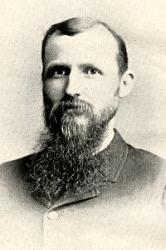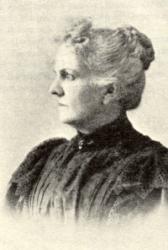
1835 - 1920 Hymnal Number: d41 Author of "If you cannot on the ocean sail among [amongst] the swiftest fleet" in Onward and Upward Gates, Ellen, née Huntingdon, of Elizabeth, New Jersey, is the author of several popular pieces in the American Mission and Sunday School hymn-books. Of these the following have passed from the American books into Sankey's Sacred Songs and Solos:—
1. Come home, come home, you are weary at heart. Invitation.
2. I am now a child of God. Saved through Jesus.
3. I will sing you a song of that beautiful land. Concerning Heaven.
4. O the clanging bells of time. Yearning for Heaven.
5. Say, is your lamp burning, my brother. Watching and Waiting.
Concerning her poem which is used as a hymn in America, "If you cannot on the ocean" (Duty), Duffield says her account of its origin is as follows:—"The lines were written upon my slate one snowy afternoon in the winter of 1860. I knew, as I know now, that the poem was only a simple little thing, but somehow 1 had a presentiment that it had wings, and would fly into sorrowful hearts, uplifting and strengthening them." (English Hymns, 1886, p. 257.)
--John Julian, Dictionary of Hymnology, Appendix, Part II (1907)
======================
Gates, Ellen, p. 1565, i., now (1906) of New York city, was born at Torrington, Conn., and married to Isaac E. Gates. Her poems, &c, were published as Treasures of Kurium, 1895. Concerning Dr. March's hymn, "Hark! the voice of Jesus crying" (q.v.), and Mrs. Gates's "If you cannot on the ocean," some confusion has arisen, mainly, we think, from the fact that the opening line of Mrs. Gates's hymn, written in 1860, and the first line of Dr. March's second stanza are nearly the same, i.e., "If you cannot on the ocean," and "If you cannot cross the ocean." The incident which associates the late President Lincoln's name with this hymn is thus set forth by Mr. Philip Phillips in his Singing Pilgrim, 1866, p. 97:—
"The words of this truly beautiful song ['If you cannot on the ocean'] were written by Mrs. Ellen H. Gates . . . When our lamented President Lincoln heard Mr. Phillips sing it at the Hall of Representatives in Washington, Feb. 29, 1865, he was overcome with emotion, and sent up the following written request [given in facsimile on p. 97] to Hon. Wm. H. Seward, Chairman, for its repetition:—' Near the end let us have "Your Mission" [the title of the hymn] repeated by Mr. Phillips. Don't say I called for it. A. Lincoln.' "
It was through this incident that the hymn became known through America as " President Lincoln's favourite hymn." [Rev. James Mearns, M.A.]
--John Julian, Dictionary of Hymnology, New Supplement (1907)
Ellen M. H. Gates




